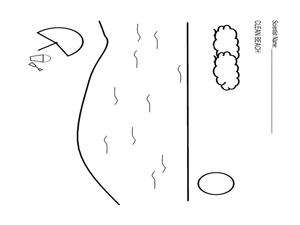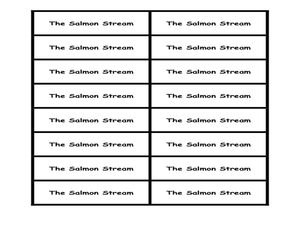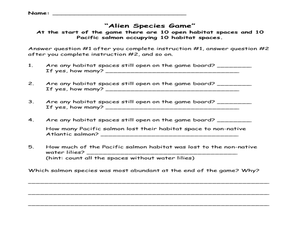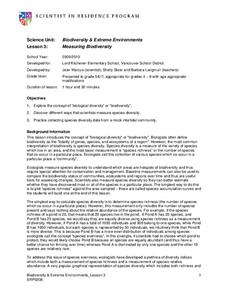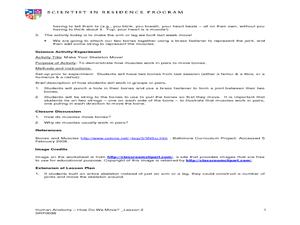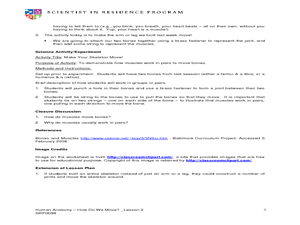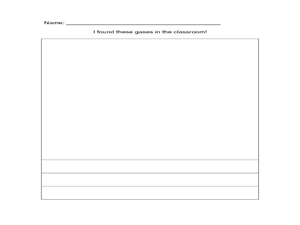Curated OER
Models as Tools for Ecosystem Management
Fifth graders explore the concept of environmental management. In this ecosystem lesson plan, 5th graders discover how models help scientists learn more about managing ecosystems. Students create their own model, make observations...
Curated OER
Pacific Salmon and Mountain Pine Beetle
Young scholars compare fish anatomy. In this teacher demonstrated dissection instructional activity, students compare fish anatomy to that of humans. They explore different fish and their unique properties. There are 4 distinct...
Curated OER
Fish Hazards
Students study the Pacific salmon and see the different challenges they face. In this environment lesson plan students complete several activities that show how humans have affected the salmon environment. These activities have...
Curated OER
The Journey of the Pacific Salmon
Students examine the journey of the Pacific salmon. In this salmon species activity, students review the stages of the salmon life cycle and conduct an experiment to determine how the water and habitat changes during each stage.
Curated OER
The Salmon Stream and Vegetation
Students explore the ecosystem and food chain by researching Pacific Salmon. In this fish habitat lesson, students discover the life cycle for salmon, where they spawn and what they eat to survive the harsh elements. Students participate...
Curated OER
Salmon and the Non-Native Species
Students investigate the affect of non-native species on Pacific Salmon. In this non-native species and Pacific Salmon lesson, students participate in a competition and habitat loss game. They play the game in groups, while answering...
Curated OER
Journey of the Pacific Salmon
Students explore oceanography by researching migrating fish. In this Pacific Salmon lesson, students participate in a board game activity in which they move a salmon through their annual journey to the spawning habitat upstream. Students...
Curated OER
Aquatic Ecosystems
Students study the diversity of marine life and their habitats. For this aquatic ecosystems lesson students complete a lab activity and experiment.
Curated OER
Animals and Plants of BC's Rocky Shore
Students fill out a fact sheet and look at diagrams of BC's shore and the animals that live there. In this habitat lesson plan, students discuss the plants and animals and the different zones they live in.
Curated OER
Animals and Plants of BC's Rocky Shore: lesson 3
Students create a mural of the food chain of the animals and plants of BC's rocky shore. In this food chain lesson plan, students also play a food chain matching game.
Curated OER
Measuring Biodiversity
Students collect species data from a mock intertidal community. For this biology lesson, students graph their data and analyze the species in it. They construct a species accumulation curve and present it to class.
Curated OER
Analyzing Intertidal and Deep Sea Vent Communities
Young scholars study how scientists measure diversity. In this diversity lesson students look at marine communities and look at data to calculate diversity in 3 different ways.
Curated OER
The Skeletal System
Students research the skeletal system. In this anatomy lesson plan, students measure their bodies to find the approximate length of their bones. They draw and cut out each of the bones and then attach them using brads or glue.
Curated OER
Human Anatomy- How Do We Move?
Students examine the muscular system. In this muscular system lesson, students first draw a realistic representation of their leg or arm bones. Students do several activities to attach these bones to "joints" with string to simulate...
Curated OER
Human Anatomy - How Do We Move?
Fifth graders discover how blood moves around the body. In this circulatory system lesson, 5th graders feel their pulse before and after exercise. Students count their heart rate. Students use the scientific method to record...
Curated OER
Human Anatomy- How Do We Move?
Students explore the human anatomy. In this respiratory system lesson plan, students conduct an experiment to simulate the capacity of human lungs.
Curated OER
Human Anatomy -- How Do We Move?
Students create a model of the digestive system. In this human anatomy lesson the students examine features of the digestive system. The students perform an experiment.
Curated OER
The Nervous System
Students investigate the nervous system. In this anatomy lesson, students identify and define vocabulary related to the nervous system. Students role play the parts of a nervous system and perform an experiment measuring and...
Curated OER
Elaine Humphrey, Gwynne Thompson
Second graders become familiar with the parts of the microscope and how it works. In this microscope lesson plan, 2nd graders experiment with different light and settings. Students answer questions based on their...
Curated OER
Force and Motion
Students experiment with force and motion. In this force and motion instructional activity, students test gravity using a variety of objects. Students rotate through a series of stations which use force, motion, friction, and inclines....
Curated OER
Matter: Solids Liquids and Gases
Students participate in a science experiment to understand that matter takes up space. In this matter lesson, students experiment with solids, liquids and gases to recognize that matter is everywhere. Students make observations and...
Curated OER
Solids, Liquids and Gases - Part 2
Students experiment with balloons, soda water and raisins to find out about the states of matter. In this solids, liquids and gases lesson plan, students complete a group activity with balloons to recognize the state of matter in...
Curated OER
Heat and Matter
Students explore liquids and solids by conducting in class experiments. In this matter lesson, students define the properties of matter and how heat can change those properties. Students experiment with heating objects such as butter and...
Curated OER
Matter
Students recognize that some changes to matter are reversible and some are not. In this matter instructional activity, students experiment a physical and chemical change. Students record experiment results in their science...




